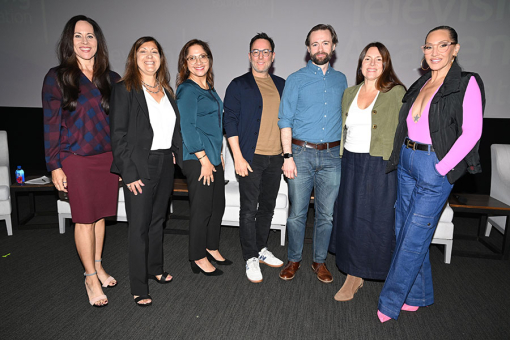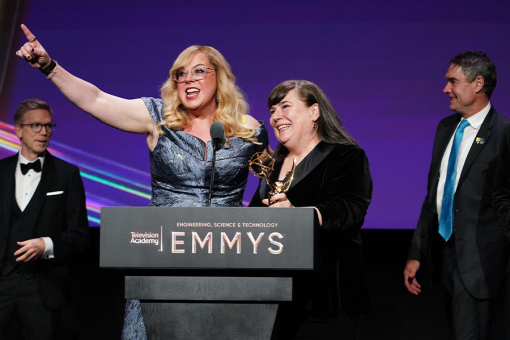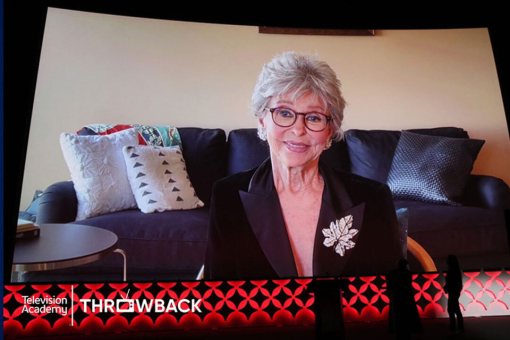The honorees at the 26th Television Academy Hall of Fame induction ceremony have left indelible marks on the television medium not only through their individual achievements but through the influence of those achievements on countless others.
See the 26th Hall of Fame photo gallery and watch all the presentations and acceptance speeches.
A few examples: suggesting to a network founder that he move his entertainment division from New York to Los Angeles for better creative access; telling stories in a fictional performing arts high school so powerfully that real-life schools were established around the globe; educating viewers on history and culture; and blazing trails and opening doors for Black and Latino representation and employment on screen and off.
As Hall of Fame selection committee chair Rick Rosen noted at the November 16 event, each of the six industry icons joining the Hall of Fame, "defines the true nature of leadership and creative excellence. They're not content with the status quo. They strive to exemplify excellence, and they're passionate pioneers who promote the best of their craft in all that they do."
The celebratory gathering, which was held at the Saban Media Center in the NoHo Arts District, saw the induction of actress-choreographer-producer-director Debbie Allen; documentarian Ken Burns; former CBS and Warner Bros. executive Bob Daly; BET cable network founder Robert L. Johnson; actress Rita Moreno; and cinematographer-lighting designer Donald A. Morgan, ASC.
Also honored: actor-director-activist Sean Pean, who received the Bob Hope Humanitarian Award for his emergency relief work in response to earthquakes, war, Covid-19 and other crises. Additionally, busts of previous Hall of Fame inductees Katie Couric, Julia Louis-Dreyfus, Shonda Rhimes and Joan Rivers, crafted by sculptor Richard Becker, were introduced via video and viewed on the Hall of Fame Plaza.
There were more than a few tears shed and deep calming breaths taken onstage during the acceptances, as honorees noted special people in their work and personal lives and meaningful lessons learned. Daly, for instance, learned from CBS founder William S. Paley never to be late, and from Warner Bros. executive Steve Ross that, "the most important thing [in an organization] was the people. They were the heart and soul of the company, and to treat them well. And we did."
Morgan, the first director of photography named to the Hall of Fame, noted the importance of family, along with several other elements crucial to success in television. "First, be passionate," he said. "You can't achieve anything great without your energy and excitement in your craft. Second, our work is a collaboration. Third, be positive. Don't look at the 'why not,' or 'I can't.' Focus on 'How can I make it happen?' And then find a way to do it."
Both Morgan and Allen have found ways to make entertainment careers happen for people of color, and to affect viewers with their own passion. Said Allen, "We're so privileged and so lucky to work in an industry, in a community, where we can touch millions and millions of people around the world. We are messengers of change. We're messengers of warning, ... of hope and possibilities. ... Tonight has given me cause to pause to look back for a moment. But it gives me a greater cause, to wake up tomorrow and start brand new, with new ideas and new energy. Thank you so much for this incredible honor."
Johnson's "new idea" was the founding of Black Entertainment Television in 1980, a cable service focused on programming for African Americans and the nation's first Black-owned cable television network. "BET defines what happens when the white business community embraces a Black vision," he said. "We create an opportunity for hundreds of young Black men and women who never thought, even though they'd seen Black faces in front of the camera, that they'd be running the business behind the camera. That's what John Malone [now chairman of Liberty Media, who financially backed BET] and I created, and that was the message we want to give to the entire creative industry: bring that combination of capital and talent together, to create diversity."
Burns has made his television mark with compelling, multi-episode documentaries. "Forgive me, I have a brief ten-part response to the Television Academy," he quipped. "Sharing stories is in our DNA. It is how we learn, dream and navigate the world. It brings us together. Stories also ask us to listen, to pay attention to character and its development, to structure and environment. ... It is such an honor to be with you tonight. My deep, heartfelt thanks to the Television Academy."
Moreno accepted virtually. "I am truly honored to be inducted into the Television Academy Hall of Fame," she said. "Thank you. I hope it will be said at my funeral what must be said tonight: 'She regrets she cannot be here. She's working.'"
Penn, who earlier this year starred opposite Julia Roberts in the Starz limited series Gaslit, has been working, too, busy with his nonprofit CORE (Community Organized Relief Effort), which he founded in 2010 after Haiti's devastating earthquake; he'd previously provided assistance after Hurricane Katrina hit New Orleans in 2005. CORE focuses on emergency response, disaster preparedness and environmental resiliency in underserved areas facing natural disasters and, in the case of Ukraine, war. Accepting the Bob Hope Humanitarian Award, Penn expressed his admiration for the people of Ukraine — "It's a magic show of unity there" — and beseeched listeners to write to members of Congress to request that defense equipment be sent there. "I am very, very appreciative for the consideration the Academy has chosen to bestow upon me tonight," he said. "Thank you."











